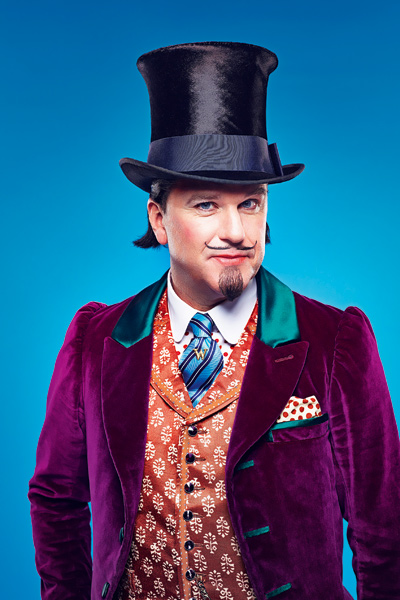Off to Wonka. With no preconceptions either. I’ve never seen this story on stage, page or screen and it strikes me as a dysfunctional hybrid of Oz and Twist. The show kicks off with a cartoon history of chocolate which — whoopsidaisy! — omits to mention sugar as an ingredient.
We meet Charlie Bucket, an angelic drudge, who must win a prize in order to rescue his whining, crippled parents from impoverishment. He visits Willy Wonka’s candy emporium along with four surpassingly obnoxious child-rivals. There are two grotesque beauty queens (one is slaughtered early on in an industrial accident). There’s a Bavarian fatso who scoffs garbage non-stop and belches into the microphone. And there’s an Americanised thug who wants to become a mass-murderer and likes to mime shooting adults, especially women. He despatches his victims with a catchphrase, ‘Game over’ or ‘You’re dead’. A fine young actor, Jay Heyman, performs this bloodthirsty jape with an excellent sense of macabre comedy.
After various delays and digressions, Charlie wins the prize, which turns out to be control of the chocolate bars. Is that it? Yup. Afraid so. The whole thing is utterly inscrutable. The urchin Charlie and his nauseating family belong to the Industrial Revolution. All the other characters are modern apart from Willy Wonka, who seems completely detached from human history. A slimmed-down Douglas Hodge is marvellously forceful on stage and plays the role as a charismatic ringmaster. But who is Wonka? A sinister megalomaniac, a world-weary billionaire, a decadent miseryguts or just a fatuous charlatan? Hard to say.
The producers are smart enough to know that Wonka is a lucrative franchise whose feeble storyline, hateful characters and troubling message — ‘chocolate is a superfood!’ — add up to a whole heap of problems. How to compensate? Visual excess, of course. All the talent and money here have been lavished on the flashy and diverting set designs. The show lurches, like one of Tim Burton’s oddly heartless films, from colourful artifice to colourful artifice. A disappointment for adults. But the kids don’t notice or care. ‘Say it was good. Don’t say it was rubbish,’ ordered my seven-year-old son. He was very insistent on this point. And let me register my gratitude to the producers for inviting us at all. Blockbuster musicals are entirely immune to journalistic praise or censure. Word of mouth alone exalts or destroys these money-munching circuses and the show’s backers had nothing to gain by welcoming me and my sneering pen to the best seats in the house. The wine is good too. Pricey but palatable. Arrive early, park the brats in their berths, and take a stroll around the theatre’s soaring internal architecture. It’s nearly as dazzling as the Foreign Office. My guess is that Wonka will create enough kiddie glee to guarantee its survival. But what a pity it isn’t good!
Wilton’s Music Hall has revived four forgotten Victorian playlets. Two are weak, two excellent. Box and Cox, written in 1847 by John Maddison Morton, was one of the most successful farces of the 19th century. A fraudulent landlady lets a single room to two lodgers. Cox is a hatter who works by day. Box, a printer, works at night. They meet by accident and the discovery of the swindle leads to further revelations. The production moves at an excellent clip and has just the right flavour of knowing silliness. But the social nuances have gone missing. Victorian productions emphasised the hatter’s pretentious manners and the printer’s degraded cockney vulgarity. This social gulf adds to the hilarity when both men discover they are betrothed to the same rich widow. The complications redouble when they learn that they are, in fact, brothers estranged during childhood. ‘Have you a strawberry mark on your left arm?’ says Box. ‘No!’ says Cox. ‘Then it is he!’ One can imagine the young Oscar Wilde observing these inflated absurdities and realising that the idiom could be pushed much further.
Duel in the Dark was written by Joseph Stirling Coyne, a co-founder of Punch. A doubting wife tests her husband’s fidelity by following him to Paris. She disguises herself in a red wig and sunglasses and poses as a French adventuress eager to elope with him. He agrees but with some reluctance. When she removes her disguise she convinces him that she has a lover. A duel is arranged and he shoots his competitor in the dark not realising that he has fired at his wife, now wearing a new disguise, and with fake bullets. The plot is too cumbersome for absolute comfort but Coyne’s language is marvellously lyrical and inventive. These plays last 25 minutes each — sitcom length — and a season of revivals with stars playing the leads would be a treat.







Comments